In this episode we dig into the relationship between freedom and discipline in the martial arts. Although many of us look for more freedom through our training and practice, how we get to it is a big question. Constraints – inside the classroom and inside our heads – determine a lot about how far we can go. From the group circumstance to the individual experience, creating the right mental framework can determine a great deal about our results.
•••
Listen on iTunes: https://itunes.apple.com/us/podcast/freedom-and-constraint/id1015990733?i=1000411136718&mt=2
Adele’s Kickboxing Experience
“After being on an extended training break from kickboxing, I am now REALLY able to see and appreciate the benefits of my training – more so than the first time around! I am more energetic and active during the day. Instead of spending my nights in front of a TV or computer, I find myself running to train. I love the feeling after a great class, and that feeling alone is enough to keep me from snacking.
“Martial arts to me is about self-defense and awareness. The physical benefits – weight loss, muscle toning – are an added bonus. Being able to train with my husband and the friends I have made motivates me to push thru even the hardest of classes or personal obstacles.
“I am so thankful for all the phone calls, conversations and encouragement from the instructors. They inspire and motivate me. When I was away from the training, they were pushing me to get back on the mat. I love this place!”
-Adele
My BBJJ Jiu-Jitsu Experience
Just 2 years ago I weighed 450lbs. I could barely move – it weighed on me to do a simple task. I had let things go too far for too long and I needed to take action right away. I couldn’t just get on a quick diet or do some exercise every other day. I had to change who I was.
So I dedicated myself to improving my health and fitness. As I made a little progress, my brother-in-law would constantly suggest I try his Jiu-Jitsu school, Brooklyn Brazilian Jiu-Jitsu. After some hesitation, I decided to give it a try. And I can honestly say it’s been the best decision I ever made.
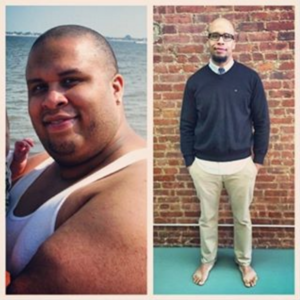
It took me over a year and a half to lose 100lbs in the gym. After 8 months at Brooklyn Brazilian Jiu-Jitsu I lost about 80lbs. It’s like my instructor often says, “if you put in the work, you’ll see the results. Things aren’t just going to happen…you have to MAKE them happen”.
The gym wasn’t doing it for me. I didn’t realize it at the time, but what I needed was the right environment.
When I came here I couldn’t even do some of the warm-up exercises. My classmates probably remember me wearing sweats because I couldn’t fit into a full uniform. Nowadays my uniform fits me baggy and I move like I never thought I could.
I’ve gone on to lose more weight since then, but that’s not all. Training here has been an amazing experience…this is a community I want to be a part of. We have the best professors and instructors – they’re great leaders. I want to be an extension of that and I see it here everyday. I’ve found a safe place to train and grow. I haven’t had a partner I was uncomfortable with. Doesn’t matter if we’ve trained together before or not…we all have a bond. We start with a bow of respect and we end with a handshake.
Like most people, I was hesitant to begin this whole process. What I discovered was that beginner classes here are taught in a friendly, social and noncompetitive environment. It’s 100% geared to teaching the newest students the basics of fitness and self-defense in a safe and effective way.
This school is unlike any Jiu-Jitsu school I’ve ever heard of. They want everyone that comes through the doors to have a safe, professional experience…and it’s by design. You feel like a special person from the moment you walk through the doors – you won’t believe how friendly the students and staff are, and you also won’t believe how clean we keep our school. This is a professional training facility in every sense.
Training Over 40? 3 Big Reminders For You
A friend of mine, who I haven’t seen in years, contacted me on Facebook. He asked me a question I’ve answered dozens of times as an instructor:
“I’m 40…can I really start training at my age?”
My unqualified response is – of course – yes. It’s never too late.
But there are a few important caveats for anybody who’s beginning (and these aren’t bad reminders for those of us who have been practicing for a while either…)
First, know that starting is usually the easy part. Staying takes work. In fact, it may take your 40 years of living to be able to do it. Now that doesn’t only mean that it’ll be physically demanding all the time, because you’ll have peaks and valleys. But managing the discipline, focus, new choices and thought models always asks something of us.
Next, it’s true that choosing your school can be the most important decision you make. This is true no matter how old or young you are. When it comes to the longevity of your training its important for you to look at the long arc, and the values of your school play a big role here. For someone who’s over 40, a “sport” approach to martial arts that favors athleticism, flexibility or speed might not be the best fit.
By the way, don’t envision yourself as a 40-year-old doing Martial Arts. Instead, try to picture yourself as a 50-year-old doing it. And then as a 60-year-old. Why? Well, this thinking can help you prepare yourself mentally for a marathon rather than a sprint. Lots of the benefits of martial arts training accrue over the years; even if all you want is some self-defense basics, you might find that a few good things done repeatedly over time become great.
And don’t think of yourself like this:
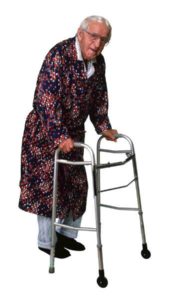
When this is more like what you’re going for:
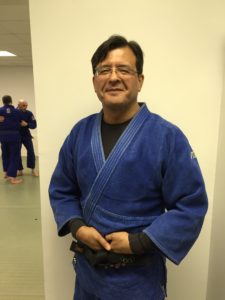
(You can learn more about getting started right here: starting at Brooklyn Brazilian Jiu-Jitsu)
Now, whether you’re 40 years old or not, if you’re considering martial arts – Jiu-Jitsu or Kickboxing or anything else – there are a few other things that really are worth mentioning:
1. Find a place that isn’t solely committed to training fighters. In fact, if you’ve been reading this blog, you know that we recommend you find a school that isn’t at all into fighting or competition.
2. Watch a class. Pay attention to the pace and the faces of the students. Are they being aggressive and competitive or are they being playful and having a good time? If someone accidentally gets bumped or bruised (it happens from time to time), does his or her partner care? This will give you an indication of the temperament of the school.
3. Meet the instructor. Make sure they’re someone that has time for you. Ask them if they think you’re too old or too out of shape or too whatever. If they do, move on. Someone else will be willing to give you the attention that you deserve.
(And remember that not all black belts are great teachers, and not all great teachers wear a black belt. So you don’t need to obsess about what degree black belt or where it’s from, etc. First find out if they care about safety and about people.)
4. Some practitioners train like they have something to prove, rather than something to improve. Don’t do this. If you’re a younger person, you shouldn’t need to be one-upping your classmates. If you’re an older person, make sure you’re not pulling an “Al Bundy”, trying to relive the glory days of when you were a star athlete in high school.
5. Start slow and pace yourself. You’re excited to learn. And to know more. And to “get good.” But just relax and settle into a rhythm of 2-3 classes a week and you’ll get there faster.
6. Keep in mind, if you are over 40, that there will be a lot of students younger than you…and who will be your “senior” when you’re on the mat together. Give them that respect. Listen to their coaching and their guidance. Chances are, if their instructor has coached them well, they’re probably right.
Fair enough?
(And you can learn more about how we do what we do here.)
If you’ve found the right place for you, you’ll have people you can trust. You’ll be able to assimilate with the culture of the school and you’ll do just fine.
Don’t forget that its important to enjoy your training above all. Not in a short-term, instant-gratification way, but in a deeper, more mature way.
I think you’ll agree with me when I say that it can be incredibly profound and rewarding. It can teach us lessons about life and our relationship with others that are hard to get anywhere else. It can help you get into and stay in the best physical shape of your life.
Earlier I mentioned that starting might seem challenging. So just get it over with. The next, and most important, step is delving deeper into the practice, learning more about yourself and getting fitter as you go.
Good luck! Leave any comments or thoughts below for us.
Getting More Out Of Your Day
(3 Tips from the Dojo to Use Right Away)
It’s nice to say that we’re going to build confidence and responsibility, but what does this mean in practice?
It’s nice to say that you’re going to set goals, build confidence, take on more responsibility in your life… but what does that mean in the day-to-day?
How will you do it?
In the martial arts, there are a few strategies we use to help us squeeze some of the juice out of the things we’re experiencing as practitioners…and they’re simple enough to help anyone – no matter the age or stage.
One way is to change our thinking habits. Not just what we do, but how we process.
Here’s a list of three ideas you can try on right away. I don’t recommend trying to excel with all three of them, especially not all at once, but try one at a time and see what helps you.
1. Practice thinking bigger. Even though we’re exposed to all sorts of new experiences, skills and personalities every day, we forget about them pretty quickly and go back to our “little” ways of thinking. This is especially true in the Martial Arts. So start developing the habit of noticing when you’re shrinking back to your “old” habits and ways of thinking. In the dojo, we find that Black Belt expansiveness is far more exciting than White Belt limits. Not only that, but we need to be careful about “thinking small” – we might accidentally become successful at creating a mediocre life.
2. Decide in advance. One manifestation of this is “visualization”, but what we’re talking about is more closely related to expecting more from ourselves. We can “decide in advance” to approach others with more openness, to push ourselves outside our comfort zone, to try something different. Don’t wait until you’re in a crisis or a difficult situation. This stuff has to be planned out beforehand so you have a pool to draw upon. And it works well on the mat or off.
3. Accept 100% responsibility. Blaming others does more harm than good. The tricky part about this is to accept responsibility even when your logical mind is telling you that someone else is at fault. So what are you accepting responsibility for? Your own reactions. Having great emotional control means acknowledging when something sets you off. The classroom is too hot, your partner isn’t paying attention, you’ve run into traffic – these are all very powerful emotional triggers in training. The same in all the other parts of our lives, whether we’re at home or at the office or out with friends. If we’re not looking, it’s easier to tell ourselves a convoluted story than to notice that we’ve let something upset our balance. So don’t blame and don’t complain.
There are other ideas, of course, but these are a good start.
And any time you find yourself feeling unfulfilled or frustrated, take a look back at whether your mental habits are helping or hurting you. Ask yourself, when you’re in class and right afterwards, whether you’re showing your training process deep respect and appreciation. Are you expanding or contracting? Consider whether you’re focused on helping them others or protecting yourself.
If you can stay mindful of the process, picking up a little momentum with these three tactics, you’ll find that there’s more juice to squeeze every time you train.
Did we miss anything? Are there other strategies you use to “squeeze more juice” from your daily activities? Let us know in the comments!
Read more about our cooperative method at The Martial Arts Mind.
Not a BBJJ student yet? Check out the easiest way to start by clicking here.
One of the troubles I struggled with as a younger person was my own fear of rejection. In it’s mildest form, it was a worry that I wouldn’t be accepted. It seemed to show up everywhere I looked:
I thought I wouldn’t be able to make friends.
I thought I wouldn’t ever have a girlfriend.
I thought people would laugh at me if I tried out for the team and looked foolish or didn’t make it.
I took everything so personally. If I called someone and they didn’t call me back, it was wasn’t because they were busy or just missed my call – it was because there was something wrong with me.
When I look back, I was allowing my fears to dictate my decisions. As a result, I never felt like I was making mental or emotional progress. I wasn’t taking any meaningful steps to a better life, no matter what activities or sports or hobbies I was involved with.
It’s my belief that as adults, we often stay in negative, unfulfilling relationships because we’re afraid to risk the vulnerability it takes to enter new, good relationships.
For me, it reached a point where if someone was willing to influence me I would let them. It didn’t matter if they were influencing me positively or negatively; I just went along.
My fear of rejection drove me to do “whatever it took” to feel included. I lied, cheated, and stole in order to avoid being rejected. And in the end, I was barely holding on to my integrity by a thread.
What happened?
Well, it started by reading a few books and honestly looking at where I was in my life. What came next was Martial Arts training.

I began at BBJJ partly because it stripped away my trouble spots – there wasn’t any “team” I had to make it onto, and there weren’t any “in-crowds” for me to try to fit in with. I could focus on my own personal goals without that fear of not being accepted.
The things I used to hide behind weren’t there anymore. And instead of falling apart, becoming an emotional wreck or getting aggressive, I found myself…happier.
Most people think martial arts practice – especially Jiu-Jitsu – is about getting “up close and personal” with a sparring partner or a classmate doing the techniques. But when I started practicing regularly, I got “up close and personal” with myself and my fears.
With guidance from my instructors, I started to see myself acting out of fear…and once I started to see it, I couldn’t NOT see it.
That gave me the impetus to go to work.
Brooklyn Brazilian Jiu-Jitsu gave me the confidence that I didn’t have to do the work alone. I understood that my teachers had my back – it was like knowing I had a net while walking on a high wire.
So I did what they told me to do – I read more, and I listened more. I learned to discern who might help me…and who might not.
Ultimately, I’ve been able to swing the pendulum so far in the other direction that I am now actually able to BE a positive influence on so many people.
Now, I can’t say that I never make decisions out of fear anymore…but I can say that it’s rare. And I can look myself in the mirror and know: I turned one of my greatest challenges into one of my greatest victories.
Challenges have the potential for greatness – not just despair. I recently dealt with an injury and I immediately looked at how it will eventually add to my Jiu-Jitsu practice and my life rather than detract from it. My teacher has always told me that tough times don’t last…tough people do.
And through this personal experience of turning challenges to victories through my work at BBJJ, I now know that it’s true.
You know, I’ve always found it incredibly admirable when people are able to turn their biggest challenges into their greatest victories. Many of us have been inspired by stories of Beethoven and his ability to overcome deafness to write some of the world’s most beautiful symphonies.
And I imagine from my instructor’s point of view, it’s no less powerful to watch a student turn low self-esteem into an ever-growing, positive self-image.
Jason’s jiu-jitsu journey began at BBJJ in 2008. He’s credited his martial arts training with improvements in everything from temperament and patience to reaching personal fitness and relationship goals.
Defining Black Belt: BBJJ Black Belt Graduation Keynote, November 2016
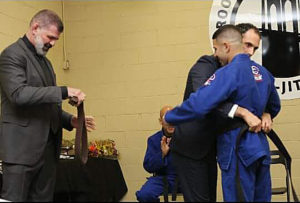
We define black belt in all sorts of ways – commitment, courage, humility, humanity. And across the world you’d be hard-pressed to find two people who agree exactly on what it means.
Is it a perfect technique? A demonstration of mental toughness? An ideal of perfection?
It is all of those things, but ultimately it cannot be contained by them. At the end of the day, each of us defines black belt for ourselves.
As black belts, just as human beings, we are all much more than just the sum-total of our past experiences. And the martial arts is a great reminder of this fact.
We make mistakes, we forget important details, we miss opportunities, and yet somehow we’re able to continue to practice.
We hit personal goals, have peak experiences, do more than we though we could, and yet we keep raising the bar to keep satisfaction just out of reach.
We are not the mistakes we’ve made or the experiences we’ve had. We are not our successes, any more than we are our failures.
We are whatever it is we tell ourselves we are.
And interestingly, this doesn’t begin at black belt…it begins at white belt.
At the moment we start our training, we have a chance to step away from thoughts that have defined us in the past and reformulate who we want to be.
We get that gift and that responsibility by “beginning anew”; it’s by virtue of shifting our thoughts about what defines us that we start to reconfigure who we might be.
So in this way, becoming a black belt is no different than the rest of our training. You define it for yourself, just as you’ve done all along.
As you know, some people choose to define it as a “tough fighter” or a “tournament champion” or an “alpha male or female”. If that’s it for you – if that’s as far as you want to go with it – then I think you’re missing a great opportunity for a bigger shift.
It’s not just chance to stand at the doorway and peer through. It’s a moment when we can cross the threshold.
So we can say, “Black belt for me means I’m becoming a better father.” Or “black belt for me means that I am going to be self-confident person, I’m not going to let dark thoughts dominate.”
Or “black belt for me means independence – I no longer need to allow the negative things that others say into my sphere”.
Or “black belt for me means emotional control, where I don’t lash out with my moods or my temper”.
So the big question today for our graduates is…who – and what – do you tell yourself you are?
Because that determines quite a lot about how the world shows up for you.
Are you meeting challenges the way you say you are, or are you falling back on old familiar ways?
Are you keeping first things first – prioritizing your most important values and principles – or are they subordinated to your conveniences?
For us at Brooklyn Brazilian Jiu-Jitsu, we are always working to be a force for good in the world. To recognize and remember that being present, aware and compassionate has a real value in our daily lives, irrespective of the currency or attention that our culture may give to them.
That’s who we choose to be at the end of the day, and the martial arts is how we’ve chosen to enact that. We may not hit the target 100% of the time, but we are always aiming at it.
The choice we ask you to make today is to decide in advance who and what you want to project into the world. Then let that guide your decisions and actions and interactions.
Considering this deeply is one of the best ways to shape your life, to make a contribution, to live well, to leave a legacy, to impact others.
If you want to be a force for good – or anything else – then make decisions from that place and your actions will inevitably show your intention.
It is not, as you know by now, very easy. Challenges abound – staying mindful, regulating your mood and emotions appropriately, treating others the right way. There are shortcuts and false promises all around, and your past exerts a powerful gravity on your present.
But the amazing thing is that this process is open to all of us – in particular, this approach to martial arts supports you. We support you.
Now maybe the notion of black belt is the first time you’ve considered looking at yourself this way, or maybe it just further supports your investigations in this area.
You can decide what you want to be, just like you can decide what kind of black belt you are. But try to remember that your martial arts practice is a chance to joyfully and frustratingly update your definitions on a regular basis. And that’s something of value for everyone.
What is a “Good” Student Anyway?
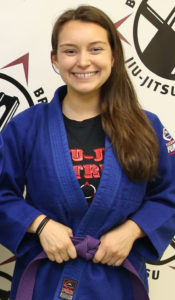 I’ve always loved being a student.
I’ve always loved being a student.
I like learning new things, so being a good student came naturally for me. Plus having a teacher for a mom helped. I got to see all the work she put into her lesson plans; I got to see first hand how much her students meant to her.
(In fact, when I was little sometimes I would get jealous of how much time she’d spend focused on her students. She always talked about what a great job teaching was, and how it might make sense as a career for me one day. Always the good student, I’d have my answer ready: “Not interested but thanks anyway, Mom.”
At the time I thought she meant it was a good option because of the schedule and the pay and the benefits. But it took me a while to understand that she had experienced something very profound – that changing the lives of others changes yours, too. More about that in a moment.)
So I had a good model early on. And since I had always thought of myself as a good student, once I began in the martial arts, I naturally continued to think of myself that way.
When the instructor would demonstrate a technique, I made it my job to focus on the steps, listening and applying what was said.
Giving it all in class, I was perpetually pushing my body to do more – more pushups, more sit-ups, more of whatever exercise we were doing at the moment – because my teacher told me to push myself.
I mean, I had to live up to being a good student, right? That’s what I thought being a student meant, do what you are told, learn what is being taught, follow the directions.
You give your teachers your time and focus and in return they give you knowledge and skills.
So I always thought of it as an exchange. If I held up my end of the deal, they had to hold up theirs.
Put differently…that my teachers owe me something if I do what they say.
But as I progressed in the martial arts here, I realized that I wasn’t being taught in that way. It wasn’t just an exchange of attention for information.
There was something else going on. Something behind the information…
…something in the philosophy.
The funny thing about being a student is you can hear the same message over and over again, but once you change something inside yourself the message seems to change, too.
You can take away a new lesson:
- That being a good student doesn’t mean blindly following the lessons, but being open to change.
- That the teacher’s job isn’t to give you skill or knowledge or anything else; in fact, it’s your job to be open and take what they share and apply it.
- That our teachers don’t owe us anything, but what we owe them is being open to growth, to change.
- That we need to be open to what they’re sharing so we can focus on creating something new.
- That when we pass what we’ve learned along to the next group of students who come along, we’re doing for them what our teachers have done for us.
I’ve come to believe that a truly great teacher wants to help their student surpass them. They want to help the progression of change and knowledge. So to be a good student we need to let go of feeling like we’re owed something and focus on what we can give.
And not only that, but looking internally on what we can give up so we can hear a different message, so we can create a deeper understanding of the lesson.
The practice of helping others out rather than expecting something from them, makes a great difference. It also might be at the root of my mother’s enjoyment of teaching and what she hoped that I would understand.
And above all I have come to believe that this synthesis of doing and understanding, of working hard and staying open, is truly what it means to be a good student.
Ms. Nova Parrish is a California native who has been in Brooklyn since 2010. She started at Brooklyn Brazilian Jiu-Jitsu as a student and has been a dedicated staff member since 2012. She is a purple belt in Brazilian Jiu-Jitsu and brown belt in both Shotokan Karate and Muay Thai Kickboxing. She feels grateful for being able to share all the martial arts has given her with others.
The Best, Most Consistent Mood Regulator We’ve Found…
Ever wake up in a bad mood? You may notice that after you get up and get moving, you start to feel a lot better and your mood begins to improve.
Have you ever had a class that when you started you really didn’t feel too good? Then after a good warm up, you started to feel much better and ended up having a great class.
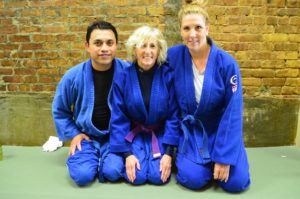 Why?
Why?
Scientists tell us that exercise influences mood. It correlates with an uptick in attitude and outlook, not to mention the overall physical benefits that come along with it.
Studies go so far as to say that physical exercise may be an alternative to traditional forms of treatment in some types of depression.
Those of us who are active in the martial arts know from experience that this is true – motion influences positive emotion. In other words, our minds are profoundly influenced by what we do (and don’t do) with our bodies.
What this means is that it’s possible to go from feelings of anxiety and frustration to ones of calmness and positivity with the help of a great martial arts class.
For example, when class starts with 10-15 minutes of proper warm up, it lays the foundation for what’s to come. But more importantly, it also serves to prime everyone emotionally through calisthenics and basic body mechanics.
(This is also why we like to see students arrive for class about 10-15 minutes early – to get themselves mentally and physically ready for a great class. Another benefit of early arrival is being around other positive, energized and highly-motivated peers.)
We know that when you combine physical movements and a powerful philosophical base, you have a dynamic combination. Add in the pragmatic elements of self-defense, and the martial arts delivers the complete package.
Developing a consistent habit of training puts your mind on the right track. Like any other habit, it takes time, effort and energy at the beginning, but the rewards are well worth it. The next time you feel a little tense or your emotions are on the dark side, remember that a body in motion both improves and influences your emotions.
Practice uchikomi, do a few bridges, drop down and do some push ups and sit ups. Or even better – come to class. In just a few minutes, your body will begin to warm up and feel much better, and soon your emotions will be out of the driver’s seat and back in the passenger seat. Your mood will improve and you’ll have more energy for the things you care most about.
Learn more about the training at Brooklyn Brazilian Jiu-Jitsu.
Want to get started with us? Here’s how (click here).





